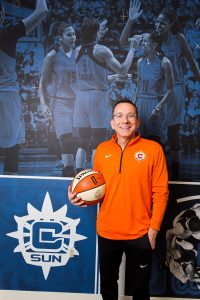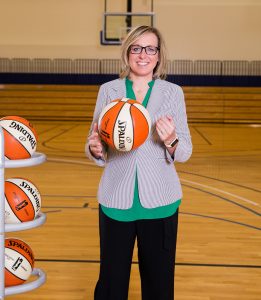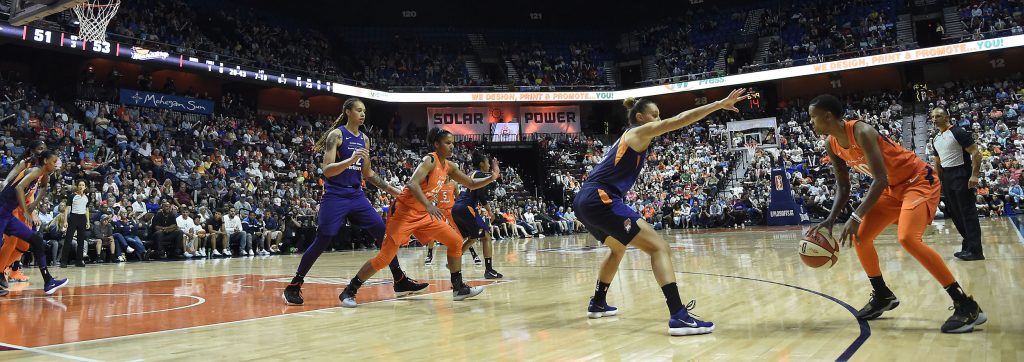The Connecticut Sun’s Curt Miller and Amber Cox set their sights on victory – and so much more
By Jane Latus / Photography by Allegra Anderson
It’s another day of chasing dreams at Mohegan Sun casino, where a steady stream of gamblers, shoppers and vacationers head toward their destinations.
But no matter how great their luck, visitors are unlikely to beat the dreams-come-true being lived out unseen to them a few levels underground, down an unadorned concrete hallway and behind the office door of the Connecticut Sun.
There you find General Manager and Head Coach Curt Miller, who as his sister’s biggest fan got hooked on women’s basketball way back in second grade, and who in high school already knew he wanted a career coaching it.
He got his wish, starting as an assistant collegiate coach and reaching the big time in 2015, when Mohegan Sun hired him for his first job as head coach of a professional team.

Making it to the WNBA wasn’t a big deal just for Miller; it had import for LGBTQ athletes and sports fans nationwide and beyond. Miller was the first openly gay male coach of any professional sport in North America, perhaps the world.
Also there is Amber Cox, vice president of the Connecticut Sun and the New England Black Wolves men’s lacrosse team since 2016.
Cox is also a basketball junkie, and gay. She has several LGBTQ counterparts in the top ranks of professional sports administration. But Miller? “He is a trailblazer,” she says.
“At the collegiate level,” says Miller, “I was always open and living authentically with my partner and the twin boys we were raising. The bubble of the basketball community knew. There was never any secret.” There just weren’t any pronouncements.
That changed with his hiring by the Sun and subsequent flood of media coverage. And now that he has a platform, Miller plans to use it.
“I’m finally in a place where I’m no longer scared about advancement in the coaching profession, and how I would be judged as a coach, and so, after probably missing an opportunity to be an advocate, and to be a role model for LGBTQ youth, I’m at a place where I feel I can give back to the LGBTQ community.”
His message: “For the LGBTQ youth who have a passion to chase a life in sports, be it an athlete, be it a coach, be it a general manager – there are people that have done it, and you can do it too. Don’t let anyone tell you [that] you can’t.”
Miller is 5’ 6” of condensed energy. “Coach is very passionate, I’ll say that!” says Sun guard Courtney Williams.
“He’s fiery,” says Cox. “He has to burn thousands of calories on the sidelines.”
Miller, 50, lives in Connecticut and, off-season, in Bloomington, Ind., with one son and three dogs. In October 2015, he separated from his partner of 20-plus years, with whom he raised his partner’s sister’s twins when she was unable to. Son Brian Seymour will graduate in 2020 from Indiana University. Son Shawn Seymour is the reason Miller uses his newfound platform for an additional cause.
“One of my twin boys fell victim to the opioid crisis that the whole country is dealing with, made a mistake and is currently incarcerated. This is my opportunity to speak on the opioid crisis, which I’m as passionate about as basketball,” says Miller. “He became addicted to prescription drugs and made a poor choice because of that addiction. He’s a great kid and deserves a second chance. And will get it.”
Cox, 44, lives in Old Saybrook with her wife Kyle Hudson, director of team marketing and business operations for the WNBA. Like Miller, she never set out to be a role model, and until college didn’t consider herself gay. “Looking back at how I identified, I was just a basketball player.”
Now Cox and Miller are participating in select Pride events, hosting post-game panel discussions on LGBTQ issues, and seizing advocacy opportunities. (But Miller hasn’t yet done the most fundamental of Pride events: “I’ve never attended a Pride parade.” Cox says, “I’ve gotta get Curt to one!”)
The Love of the Game
Miller grew up in Girard, Penn., “a Hoosier-type town, where it seems like everyone had a basketball hoop in their driveway or their barn. I grew up playing every sport you could imagine, with the exception of football.” In high school, he excelled in basketball and track and field.
Brother Craig and sister Lori also were “terrific athletes” he says.
“And all three of us are gay. Unique.”
In a way, Miller’s career began at age 7. When Lori was in high school, “I was one of those second graders, … sitting there with a notebook keeping all her stats so I would be able to tell her how she did. I was hooked because of her.”
In the Fall season of his senior year, when no teacher volunteered to coach the middle school girls, the athletic director asked if he was interested. “I couldn’t say yes fast enough,” says Miller, who at the time was training and preparing for his senior basketball season. “That season absolutely solidified ‘this is what I want to do.’ I was a basketball junkie and couldn’t get enough of the game. I knew that I wanted a career in basketball.” The 1970s weren’t the friendliest time to be a gay teen athlete in a small town, but Miller is unscathed.
“I knew back in middle school that I had feelings – but I suppressed them and hid from them. And one of the ways to do that was to be a good athlete. If I could shine in different sports, I had a way of hiding.
“In the locker room, it wasn’t always easy because of some of the things that were said about LGBT people. So while it was a little bit easier to hide in sports, you were subjected to, at times, things that would make you even more closeted,” he says.
“I had a great childhood. While I was not comfortable with myself, I think friends knew,” says Miller. “I was never bullied and didn’t have the unfortunate experiences that other LGBTQ youth have to deal with.”
Miller earned a bachelor’s degree in sports management and business administration from Baldwin Wallace University. In graduate school at Kent State, he got his first break: his assistant coach was hired by Cleveland State as head coach of that team. “She hired me at 22 as a full-time assistant. At that point, I was the youngest Division 1 top assistant coach in the nation.”
Miller – who served as assistant women’s basketball coach at Kent State, Cleveland State, Syracuse University, and Colorado State; head coach at Bowling Green State University and Indiana University; and assistant coach of the Los Angeles Sparks – added to his extremely successful track record at every turn. He was named head coach of the Connecticut Sun in December 2015, and in his second season, led the young team to the playoffs for the first time since 2012. In September 2017, Miller was recognized as the 2017 WNBA Coach of the Year, WNBA Executive of the Year and Associated Press Coach of the Year.
Cox, too, was raised on basketball, in Monett, Mo. “I picked up a ball when I was 5 or 6 years old. I loved it. I was hooked very early,” she says.

She played on a scholarship at William Woods University, where she earned her bachelor’s degree in communications/journalism, and stayed to earn her master’s degree in business administration.
“I didn’t identify that I was a lesbian until I was in college. Growing up in a small Midwestern town, clearly I was a lesbian – I just didn’t know it was an option,” she says. “And then I got to college and the light came on. You meet the first girlfriend and it’s like, ‘Oh, that’s it!’ It all becomes clear. And you look back and go, ‘No wonder it felt so weird dating those boys,’ you know? No wonder I chose going to the gym on Saturday night versus going out with the guy who asked me out.”
It took a few years to come out to her family (“There was a little fear.”) but they were accepting. Early in her career, she hesitated whether to introduce her girlfriend as just a friend, but her fear proved unwarranted. Before coming to Connecticut, Cox was chief marketing officer of the Houston Dynamo (men’s) and Dash (women’s) professional soccer teams. She had earlier served as the associate commissioner for women’s basketball at the Big East Conference.
Cox also spent nine years with the Phoenix Mercury women’s basketball team, as marketing director and later as president and chief operating officer. “That’s really where I found my calling. I think there’s no better example of equal opportunity than women earning a living playing professional sports.”
Being ‘Out’ in the Sports World
Early in his career, Miller feared complications from coming out. But not primarily for himself.
“When I was an assistant at the collegiate level, I worried, would an athletic director have the guts to hire an openly gay male as a head coach? But I also worried, as an assistant, would being an openly gay male hurt the school and head coach in recruiting wars? And would a family preparing to send their 18-year-old daughter off to college feel comfortable that one of the coaches on the staff was openly gay? I worried about hurting the institution that I worked for, hurting the head coach I was recruiting for.”
Miller was out to family and friends, but when he and his partner moved from Syracuse to Colorado State in 1998, “I knew this is who is important to me, and everyone’s going to know it. I feel like that was when I was truly out.”
He wondered if the pros would be as welcoming as the collegiate world proved to be. When Mohegan Sun approached him, “I shared immediately on that first phone call that I was a gay male. And they didn’t hesitate,” he says. “So any fear I had was quickly alleviated.”
So, once you’ve made it to the top, is it all clear skies? Not so fast.
“The frustrating part for me is, some people in our own LGBTQ community are the toughest critics. If I was coaching a men’s professional sport, they have shared with me that coaching at the highest level would be a huge deal. They perceive that women’s professional sports isn’t as big a deal,” he says.
“I’m the only gay male coach in any of the professional sports teams in North America and it’s still downplayed because it’s ‘just women’s basketball.’ It’s frustrating that the community hurts itself,” he says.
Is it a burden being the first? “No,” says Miller, though he admits to anxiety about doing it well.
“While I’m getting more comfortable with my voice, my biggest fear is that I don’t have the right words at times on behalf of the community.”
Still, that’s progress. “For a long time, I was embarrassed that I had let down the community because my life isn’t perfect. My 20-year-plus relationship had ended, we had a child get in trouble with the law and, in my mind, I was going to be criticized by the naysayers who say that you need to have a mother and a father to raise children,” he says. “But I’ve come to peace with my imperfections, and now there’s a bigger cause in the opioid crisis that I need to use my platform for, and not be so fearful in my perception that I let the LGBTQ community down by not having the perfect life.”
Now Miller’s dreams are for the best for his sons, and for the Sun to advance past the second round in the playoffs and ultimately win a championship. And for himself? Pursue a hobby, perhaps? Well, he laughs, “Basketball is my hobby.”






More Stories
Poll Dancing: Just How LGBTQ+ Friendly is Connecticut?
Make It Here, Just As You Are
Queer Joy and Queer Resilience